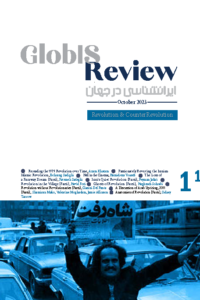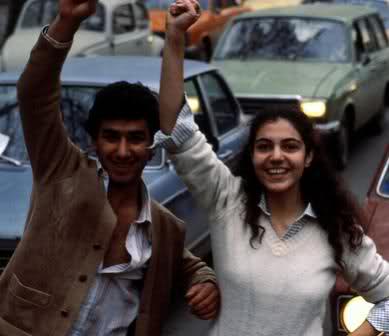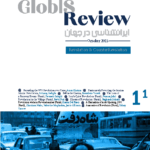Editorial Note

The 1979 Iranian revolution has garnered significant academic attention worldwide, leading to substantial publications in the social sciences both within and outside Iran. This inaugural edition of the GlobIS Review is devoted to an in-depth discussion of the 1979 revolution, given the 2022 uprising in Iran has resparked public interest in the concept of revolution in the country. Interestingly, there is a shift in sentiment as people who previously lamented the outcomes of the 1979 revolution now harbour dreams of a new one, aiming to bring about radical change to the Iranian authoritarian regime. Such public interest encouraged us to introduce recent books on the 1979 revolution and investigate how central debates around that revolution have changed through investigating the new findings and drawing attention to controversial key perspectives.
Almost all the books that are chosen to be reviewed for this special issue were published over the past decade. While reconfiguring some of the central questions about the 1979 revolution, they all add new perspectives to the scholarship, thereby bringing greater nuances to our understanding of the 1979 revolution. The four main sections of this special issue of the GlobIS Review include one paper in the Articles section, two book reviews in the Social Science in Iran, four book reviews in the Iranian Studies in the World, and finally, four book reviews in Middle East & World section.
The article Rereading the 1979 Revolution over Time by Azam Khatam uses the perspectives of seven reviewers to examine the central questions and main arguments put forth by the authors of twenty books on the Iranian revolution of 1979. According to Khatam, these literature review articles focus on debates evolved around the key characteristics of the revolution, including: its ideological characteristic as resurgence of the “Islamic identity”; its structural characteristic as an uprising ignited by the conflicts of uneven capitalist development and political autocracy; its cultural claim as an alternative modernity against colonial modernity; and its popular social characteristic as a revolutionary movement with enormous impacts on ordinary people. Khatam concludes that the articulation of the debates in these review articles have changed over time in response to shifting academic paradigms in the field and new field research or books examining the local histories of the revolution have not played a major role in these shifts.
In the first book review, Behrang Sadighi contends that Gholamreza Kashi’s book, Returning to the Horizon of the Revolution: A Discourse Analysis of Contemporary Social and Political Changes (1399/2020) is an essential text for using a linguistic approach to politics in Iran, emphasizing the significant changes in political discourse under both the Pahlavi and the Islamic Republic regimes. He does not, however, think that Kashi’s research is exhaustive, nor does he believe that it offers sufficient evidence to support his main argument about the Islamic discourses within pro-regime circles and the opposition being more prominent than the non-Islamic discourses before the revolution. Sadighi concludes that Kashi’s findings do not add to our comprehension of how clergymen emerged as the revolution’s leaders as he argues that the author’s suggestion to return to the neo-Shariati narrative of Islam is not a game-changer for Iran’s political future because the concepts such asTaleghani’s “inclusive” Islam or the “multivocal” Islam which indeed served as the central theme of the reformist project in the 1990s fail to address the significant problems faced in Iran as a result of the Islamic Republic’s state integration with religion.
The second book review is done by Hamidreza Yousefi on Hell Cinema: Six Reports on Human Incineration at Cinema Rex authored by Karim Nikoonazar (1397/2018) based on fieldwork and archival research in Iran, analysing the deplorable event of the Cinema Rex fire in his hometown, Abadan in 1978. According to Yousefi, the book provides the reader with undiscovered documents and stories as well as novel analyses of the event. On August 19, 1978, four young men from Abadan planned to set Cinema Rex on fire in support of the Revolution. The book examines this tragic event from four distinct angles: first, from the perspective of the main defendant in the trial; second, from that of the local authorities whose central goal is to erase all traces of the crime; third, from that of the ruling revolutionaries’ perspective of the incident as revealed through the trial proceedings on September 24, 1980; and lastly, from that of the revolutionary context itself, a turbulent time when sin and crime were put on hold.
The third book review is Fatemeh Sadeghi’s review of Behrouz Qamari Tabrizi’s book on Foucault in Iran: The Islamic Revolution after the Enlightenment (2016/1398) completed as part of the ERC StG 2019 TAKHAYYUL Project (853230). The book outlines how Foucault understood the Iranian revolution from a different perspective than of the predominat Eurocentric perspective to power and politics. However, Sadeghi warns the author for accepting Foucault’s misinterpretation of Shiite clerics’ approach to politics or their claim that they have no intention of establishing an Islamic state. Sadeghi also criticise the author’s postcolonial approach to the 1979 revolution by referring to ways he tries to show Foucault was flawless in his lack of support and solidarity towards femeinist politics and Iranian women’s protests against the mandatory hijab in 1979.
In the fourth book review of The Quiet Revolution: The Fall of the Pahlavi State, Peyman Jafari highlights the author’s significant contributions to the scholarly debates on how Iranian intellectuals encountered modernity in the 20th century. Jafari analyses Mirsepassi’s claim that insinuates the German philosopher Martin Heidegger had an impact on the “anti-modern” and “authenticity” discourses that existed among intellectuals and the regime’s elites prior to the revolution. Jafari argues that “anti-Western” discourses in Iran bear a stronger resemblance to either the Romantic anti-capitalist discourse, which was prevalent in 19th-century Europe, or the critique of colonialism from an anti-racist standpoint.
The fifth book review is done by Navid Fozi on one of the rare books in the field that examines the 1979 revolution through conducting fieldwork in Iran. Days of Revolution: Political Unrest in an Iranian Village by Mary Elaine Hegland (2014/1397) adds to two prominent and contentious debates regarding the revolution: the role of women in the revolution and the role of Islamic ideology in inspiring the revolutionary masses. According to Fozi’s review, Hegeland refutes the widely held misconception that the 1979 revolution was a revolt against modernization and instead highlights the general dissatisfaction among the subjects of her study as they dealt with the fallout from uneven modernization under the Pahlavi regime. According to Fozi, Hegeland’s ethnographic research demonstrates that when the central government became weak, as a result of revolutionary protests in the cities, the villagers were able to build new social and political coalitions among themselves based on secular clan solidarities. This process helped them to shape their own conception of the revolution.
The sixth book review is written by Naghmeh Sohrabi on Shahla Talebi’s book (2011) Ghosts of Revolution: Rekindled Memories of Imprisonment in Iran, where she starts with recalling a memory of watching a young and defiant leftist woman being forced to confessions on television in the early 1980s. Sohrabi’s reading of Talebi’s memoir of imprisonment, which focuses on insanity in prison, flashbacked to this particular memory.. The book’s non-linear narrative, according to Sohrabi, is meticulous and multifaceted but also tricky because it explores issues of subjectivity and power through tales of insanity in prison, where physical torture, coercive pressures for collaboration, or the guilt of surviving can lead to mental breakdowns.
The seventh book review is about Asef Bayat’s book (1402/2017), Revolution Without Revolutionaries: Giving Meaning to the Arab Spring. This book has already been widely reviewed and translated into Persian and Arabic languages. The Persian translation, however, omits the chapters that compare the Arab revolutions with Iran’s 1979 revolution. To give weight to such comparisons, the English review by Gianni Del Panta (2018) has been translated into Persian. This review centres on the popular question of why there was no significant shift in the structure of power and state institutions following the Arab Spring. Del Panta notes that Bayat echoes the old distinction between two key dimensions of the revolution. The movement, and the change, but he avoids emphasizing the change over the movement. Thus, Bayat does not deny the existence of the revolutionary movement for the absence of change. He does not adopt an excessively process-oriented perspective either, by claiming the revolutionary situation is not over because the expected change has not yet occurred. Del Panta concludes that Bayat concentrates on the factors that contribute to the real anomaly of these revolutions.
In the eight and nine book reviews, we have added the translations of two published reviews. One is a review by Shemiran Mako and Valentin Moghaddam on The Age of Counter-Revolution: State and Revolution in the Middle East (2022) written by Jimmy Elinson to which the author has replied. The other one is Jimmy Elinson review on After the Arab Uprisings: Progress and Stagnation in the Middle East and North Africa (2021) by Shemiran Mako and Valentin Moghaddam also followed by the authors’ response. The debate between these authors centers on the question whether the Arab Spring movements qualify as revolutions by conventional definitions and whether their defeat signals the triumph of the counter-revolution and its hegemony in the contemporary era. Elinson responds positively to this query by claiming that the state of the counter-revolution has not been taken into account in the analysis of Arab revolutions, which includes its discourse, social infrastructure capacity, and the novel methods used to oppress the revolutionaries. On the other hand, like Asef Bayat, Mako and Moghadam believe that the primary reason behind the failure of pro-revolutionary movements and their inability to progress to the stage of revolution is the absence of a revolutionary ideology and the lack of plan to alter power relations in order to establish a new order.
This issue will be closed by a review on a book that analyzes the 21st century’s revolutions. In his review of George Lawson’s book Autopsy of the Revolution (2019), Sidney Tarrow provides a thorough explanation of Lawson’s methodology to examine the victorious revolutions, which is based on a relational approach, the concept of inter-society, and the logic of “configurational causation.” Lawson relies on unconventional binary comparisons and discovers the similarity of victory conditions in completely unrelated revolutions rather than similar ones. Lawson identifies two key similarities in successful revolutions. First the low levels of elite solidarity, particularly in the coercive apparatus, and second, the opposition’s ability to forge a strong revolutionary coalition. The opposition’s ability to form a coalition has weakened significantly due to the decline of “adhesive revolutionary ideologies,” even though the fragmentation of the elites is still a strong constant. Tarrow thinks the term “negotiated” revolution to be enlightening, as Lawson uses it to emphasize the unique nature of the revolutions in Eastern Europe, but he thinks that expanding the conditions for the “negotiated” model to include Arab revolutions is “a bridge too far.” Hence, Tarrow suggests that Lawson’s approach to revolutions has the potential to start a new branch of revolutionary theory, one that contributes to the general field of contentious politics.
Last but not least, we would like to express our gratitude to Dr. Fatemeh Sadeghi, for her assistance in selecting books for the special issue of this journal.








Comments are closed.